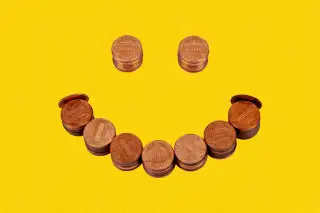Rich People Really Are Happier Than the Rest of Us: Study

The old adage that money can’t buy happiness may finally need to be put to rest.
A broad body of research has long shown that money and happiness are closely related, though it was largely believed that once someone earns enough money to afford a modest, comfortable life — usually around $75,000 — the happiness benefit trails off.
However, this “happiness plateau,” as researchers call it, could be nothing more than a convenient myth due to limited information on super-wealthy Americans. According to Matthew Killingsworth, a wealth and happiness researcher and senior Wharton School fellow at the University of Pennsylvania, the ultra-rich are far happier than people earning $500,000 a year, who are themselves notably happier than low- and middle-income earners.
Like with income itself, Killingsworth's latest self-published research found that there is a big gap in happiness between high- and low-income Americans.
“The difference in happiness between the top and bottom of the economic distribution was also quite large, contrary to the notion that money is only associated with small differences in happiness,” he wrote on his website. “The magnitude of the differences can be substantial.”
More money, more happiness?
While more money may have meant more problems for the late hip hop icon Notorious B.I.G., for most Americans, it means more happiness.
For years now, Killingsworth has been chipping away at the idea of the so-called happiness plateau. In 2023, he was a lead researcher on a widely publicized study that found earnings of up to $500,000 per year indeed increased one’s reported levels of happiness.
That isn’t to suggest people stopped getting happier if they earned more than that amount. Rather, it was a limitation of good data on people wealthier than that. That’s where his new research comes into play. It combined responses from other studies that measured a large sample of low- and middle-income earners (over 33,000) as well as about 2,200 high-net-worth individuals who are multimillionaires.
What this analysis uncovered is that not only does self-reported happiness (or, specifically in this case, satisfaction with life) increase with income, but also the happiness gap between the ultra-rich and people who have moderate incomes is actual much larger than the gap between low- and middle-income earners.
In other words, ultra-rich people are, in fact, far happier than people with modest incomes in the $70,000 to $80,000 range — the level historically associated with the happiness plateau. And modest-income earners are happier than those who earn less than them, too.
(For reference, the average income in the U.S. is about $60,000 — roughly equating to a typical response of "slightly satisfied" with life.)
Previous research based on a limited range of incomes made it difficult to determine the money-to-happiness ratio for people at the top of the income distribution, Killingsworth wrote. Many folks then filled in the blank with the idea that “each person simply needs to get ‘enough’ and can then rationally shift all their attention to things beside money,” he said. Another common theory suggests that the trappings of high society and its keeping-up-with-the-Joneses mentality actually made rich people less happy.
“The simplicity this implies may be one reason why the idea of a plateau is so attractive," he added.
But the reality is just that many previous studies that tracked income and happiness didn’t have great data on the rich. And the reason for that, at least, is obvious.
“Perhaps rich people," he said, "are disinclined to spend their free time taking surveys."
More from Money:
Here Are the 80 Best Financial Planners in the U.S.
10 Ways Millionaires (Legally) Keep Their Taxes Down in Retirement